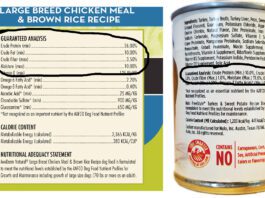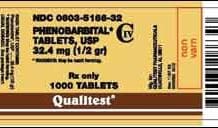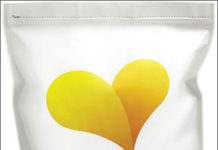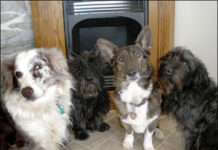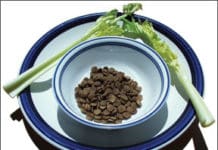Specialty Dog Food kings
I don’t think any pet food company has taken the “specialty diet” concept farther than Royal Canin, who has developed foods for dogs of every size, age, and condition, and even a few specific breed varieties. Here’s a list of its dry foods for toy and small breeds; no wonder people are confused about what to buy!
An Education in Specialty Dog Foods
It’s a very tempting concept – that a perfect food for every dog exists out there, somewhere. It must be tempting, because the pet food manufacturers keep increasing the number of products they formulate and market toward the owners of dogs of a progressively narrow description. Seriously – there are foods labeled for large breed seniors, and indoor toy puppies. There are foods that are supposedly just right for Spaniels, for goodness’ sakes! Decades ago, there was just dog food; eventually, versions of commercial foods for puppies were introduced to the market with great success – perhaps because of the introduction of commercial baby foods in the same historical period!
FDA Notifies Veterinarians of Phenobarbital Recall
On March 10, the U.S. Food and Drug Administration’s Center for Veterinary Medicine (CVM) advised veterinarians about a recall of a human drug, phenobarbital, which is used extra-label for pets. On February 5, Qualitest Pharmaceuticals recalled certain lots of product that was labeled as phenobarbital – but was actually hydrocodone/acetaminophen (Vicodin).
Frequently Asked Questions
I would like to know if you investigated Orijen dog food. I did not find it listed as one of Whole Dog Journal’s approved dry foods of 2011. Yet I noticed it pictured on the front page. In the February issue with the approved dog foods, I see on the cover a bag of Orijen dog food (which we use), but I don’t see it in your approved list. What is your opinion of this food? Is it not good?
Unauthorized Message to Blame for “Misrepresentation of Feeding People Food to Dogs”
In the November issue, we ran a news item about a press release we received from a pet food company warning dog owners about “the dangers” of feeding human food to pets. We were highly indignant that a pet food company that describes itself as blending “giddy devotion with sound nutritional principles” would blame human food for causing pet obesity and other health problems. It seemed like a throwback to the sort of messages promulgated for decades by the mainstream, “corporate giant” food makers, who routinely preach against “upsetting” pets’ tummies with table scraps or “unbalancing” their diets by augmenting pets’ meals with human food.
Instructional Books on Home-Prepared, Bone-Free Dog Food Diets
Interest in homemade diets has never been greater, especially since the huge pet food recall of 2007. Last month, I reviewed books that explained how to feed a homemade canine diet based on raw meaty bones (RMBs). This month, I’ll look at books about boneless diets – by far the largest category of books. Unfortunately, I found a lot of bad books out there. Many of the recipes provided in the books are nutritionally inadequate! There’s no harm in using them from time to time, or to replace a small portion (up to 25 percent) of a commercial food diet, but anyone who relies on these books to feed their dogs a homemade diet is likely to end up with issues that could range from dry skin to crippling orthopedic conditions.
Feeding People Food to Dogs is Not Harmful as Long as the Food is...
If you follow any pet-related blogs or other social media, the odds are you’ve heard of Nulo, a new company that has been marketing its foods aggressively through a variety of online channels. Nulo’s main thrust is that its foods and feeding programs will help your dogs reach and maintain a healthy weight – an admirable goal. Its foods are relatively high in protein (27 percent) with moderate amounts of fat (14 percent) and fiber (4 percent), appropriate for dogs who are overweight or who tend to gain weight easily. So I’ve had no objection to the marketing messages I’ve received from them (these messages were sent to members of one of the blogs I subscribe to).
AAHA to Create New Nutritional Guidelines
In January, the American Animal Hospital Association (AAHA) announced its plan to create a new set of nutritional guidelines for use by veterinarians and to publish these recommendations in June 2010.
Using Your Dog’s Bowl As a Training Tool
You may think feeding your dog is a simple matter of dumping food in his bowl and plopping it down on the floor in front of him. You may be wrong. Mealtime is fraught with significance for your dog, and loaded with opportunities for you to influence his health and his behavior. Failure to take advantage of these could actually contribute to the development and/or escalation of problems that might otherwise be averted. A few deliberate decisions and choices on your part can go far in creating harmony in your home.
Problems With Artificial Preservatives in Dog Food
Recently we've heard from a number of dog owners who are concerned about the use of ethoxyquin to preserve fish meal that is used in dog foods. We've had one e-mail forwarded to us several times expressing worry over links between undeclared ethoxyquin in pet foods and canine cancer. We have long advised owners to pass over dog food that contains artificial preservatives such as butylated hydroxyanisole (BHA), butylated hydroxytoluene (BHT), tert-butyl hydroquinone (TBHQ), propyl gallate, and ethoxyquin, in favor of products made with natural preservatives, such as tocopherols (vitamin E), citric acid (vitamin C), and rosemary extract. Though synthetic preservatives were once as recently as 20 years ago the usual preservative found in all dry dog foods, today, they appear only on the labels of low-cost and lower-quality products.
HSUS Now Selling Vegetarian Dog Food
Earlier this year, the Humane Society of the United States (HSUS) entered the pet food market with its “Humane Choice” brand of organic vegetarian dog food. According to the product’s marketing materials, the impetus for the move was “to give pet guardians an option to feed their dogs a complete and balanced food that is also sustainably grown and helps us in our work to combat inhumane factory farm practices.”
More Unconventional Dog Food
Any time we aspire to review the best products in a given category, we inadvertently miss some. Last month, we highlighted some interesting novel...



